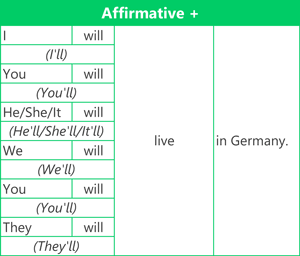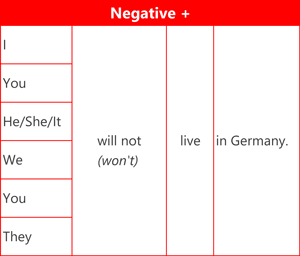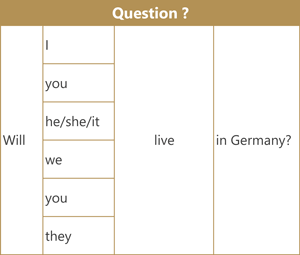What is the future simple?
The future simple is one of the English verb tenses.
You can learn more English online by visiting our free English grammar lessons, which include other verb tenses and more grammar points.
You can also find more grammar, vocabulary and communication tasks for each English level:
Use & examples |
We use the future simple tense to describe:

(1) Instant decisions
[English level A2 - English level B1]
This describes actions or situations in the future that are decided while speaking.
- It is raining outside. I'll get an umbrella.
- He has a problem with the car. He'll phone my brother tonight.

(2) Predictions
[English level A2 - English level B1]
It can be used to make a prediction about the future, to describe something that will happen. This is based on information that we know or something that we expect to happen.
- They'll have children in the next two years.
- My friend will arrive late as usual.

(3) Giving orders
[English level A2 - English level B1]
It can be used as a way to give orders and to tell somebody to do something.
- You will do you homework before dinner.

(4) Making requests
[English level A2 - English level B1]
It can be used as a way to make requests and to ask for something in a polite way.
- Will you open the window please?
Form |
How do you write and pronounce the future simple?
Form: Key points
- Use will + main verb (base form).
Here are examples of the affirmative (positive) form, negative form and question form using the verb 'live'.


Contractions
It is less common to contract subject pronouns with auxiliary verb + 'not'
- I'll not
- He'll/She'll/It'll not

Short answers
- Yes, I will. / No, I won't.
- Yes, you will. / No, you won't.
Pronunciation
We commonly use contractions (e.g. 'I'll meet friends' or 'He won't work today') for the future simple tense, especially when speaking English.
Notes |
For the future simple, we have extra information about:
- spelling exceptions for verbs and
- time expressions that you can use.
Spelling exceptions for verbs
There are no spelling exceptions for future simple, for regular or irregular verbs. Just use the base form of the verb (infinitive without 'to').
Examples:
[run] I'll run to the bank.
[be] He'll be in London.
Time expressions used with future simple
Here are time markers that can be used with the future simple.
1) next week / month / year
This gives a time in the future.
Examples:
I'll start at the new company next month.
2) later / this afternoon / tomorrow / soon
This gives a time in the near future.
Examples:
We will meet your parents this afternoon.
3) in / on / at
It is also possible to use these prepositions of time for the future.
Examples:
We'll leave in ten minutes / in a couple of hours.
I'll phone you on Saturday.
They'll visit us at the weekend.
Quizzes |
Quiz 1: Instant decisions & predictions
Last minute special offers for a music concert
[Topic: Entertainment]
Type the verbs in the future simple tense and use the affirmative, negative or question form.